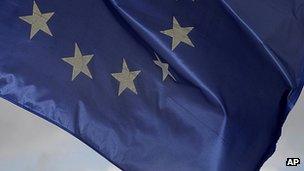Campaigners set April date for 'EU referendum'
- Published

Both supporters and critics of the EU are backing a referendum
Campaigners have said a referendum on the UK's membership of the European Union will take place in April - in one parliamentary constituency.
People's Pledge, which is led by both pro and anti-EU MPs, is planning more than 100 separate votes across the country by 2013.
Their aim is to force a national referendum on the UK's membership.
The first local referendum will take place on 5 April, in one of 13 shortlisted constituencies.
These include ultra marginals Bolton West and Thurrock and Eastleigh - Liberal Democrat cabinet minister Chris Huhne's seat - although the final location for the first vote has not yet been chosen.
'Opportunity'
People's Pledge campaigners include eurosceptic Tory MP Douglas Carswell, pro-European Labour MP Keith Vaz and the eurosceptic Labour MP Natasha Engel.
Mr Carswell said the UK's relationship with the EU was of profound constitutional significance and "by any objective assessment qualifies as a subject for a referendum".
"This campaign is not a threat to MPs, it is an opportunity. No politician ever made themselves unpopular by asking the people what they think."
Mr Vaz said he had "no hesitation" in asking the British people to settle the issue.
"We need to take this argument outside Parliament and let the British people participate in a proper discussion about our role in the EU. I am very confident if we have a referendum that the British people will vote to stay in."
The group say that the votes will be counted by a postal ballot, overseen by Electoral Reform Services Ltd.
The results will not be binding, in any way - it is all part of the campaign to try to force the government and other national political leaders to support a national referendum.
People's Pledge said the cost of the local referendum would be at least £20,000, the fee payable to the ERS to supervise the vote.
The group would not reveal who was funding the campaign. It said it had had several large donations, although the majority were thousands of small-scale individual payments.
Campaigners said they believed the referendum on independence for Scotland - plus ones for more city mayors and police chiefs - had given a big boost to their calls for a vote on EU membership.
The coalition government has promised a referendum - backed by law - on the UK's role in the EU only if there is a significant transfer of power from London to Brussels.
The Commons rejected calls for a referendum in November but only after 81 Conservative MPs rebelled.
- Published30 January 2012
- Published29 January 2012
- Published17 January 2012
- Published6 January 2012
- Published2 February 2012
- Published9 December 2011
- Published9 December 2011